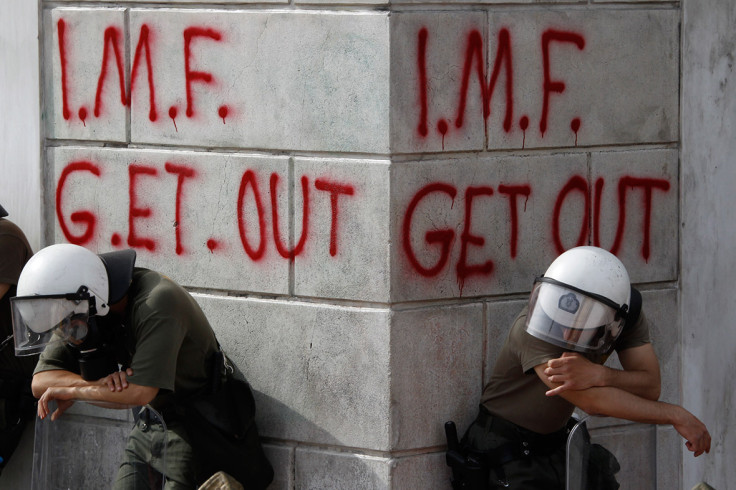Eurozone crisis: Greece stares down barrel of multi-billion euro bank run

The banks in central Athens were thankfully calm this Monday morning (22 June). Only a few people were queuing outside the Alpha Bank branch off central Omonia Square, where last week the spectre of capital controls loomed large.
After failing to reach an agreement on Thursday, Greeks withdrew €1.5bn (£1.1bn) from banks on Friday, bringing last week's total outflows to around €5bn. Greek pre-orders for deposit withdrawals on Monday were said to have already reached €1bn.
A new offer thrashed out by Athens over the weekend has been welcomed by the European Commission (EC) – the least imposing of Greece's three creditors – as "a good basis for progress".
With an emergency summit this evening, there seems to be a light at the end of the tunnel, despite revelations that Greece sent through the wrong offer late on Sunday.
This relief has rallied the Greek banks: Alpha Bank was up 16% on the markets; Bank of Piraeus 15%; National Bank of Greece gained 14.7%; and Eurobank Ergasias climbed 14.6%. Markets elsewhere also responded positively to news of the weekend workout.
Good news in the very short term, but progress will depend on the extent to which technical teams have had to review the new proposal. Various European officials have made it clear that technical negotiations cannot take place at the summit and an agreement would therefore need to be reached ahead of it.
The details of the Greek proposal are unsurprisingly vague: the Financial Times reported rumours of some concessions to eliminate early retirement and proposing higher taxes, as demanded by the creditors.
Over the weekend Greek Prime Minister Alexis Tsipras was said to have briefed German Chancellor Angela Merkel, French President Francois Hollande and the EC's Jean-Claude Juncker by phone.
A statement from Tsipras's office said that the PM has presented the three leaders Greece's proposal for "a mutually beneficial agreement that will give a definitive solution and not a postponement of addressing the problem".
Ahead of the summit, Tsipras is expected to meet with the EC head Donald Tusk, before then meeting Juncker, the European Central Bank's Mario Draghi and the IMF's Christine Lagarde this morning at 11.30am GMT in an extraordinary Eurogroup meeting that looks set to discuss the proposals put forward and will likely set the tone for the summit tonight.
Analysts at Deutsche Bank said: "Ahead of the European opening, the news of a proposal appears to have given a lift to markets in Asia this morning. Indeed the Nikkei [+0.88%], Hang Seng [+0.44%] and Kospi [+0.41%] are all up as we type.
Deutsche added that S&P 500 futures (+0.43%) are also pointing towards a positive start, while the Euro (+0.35%) appears to have been buoyed by the news of a Greek proposal. The optimistic start for risk assets appears to have fed over into the Treasury market where 10-year yields are 3.2bps higher at 2.290%.
The UK market is having a firm morning with widespread gains, as a combination of positive movements in Greece and weekend M&A press drive stocks higher. Trading around the 6800 mark and surpassing the 200 day moving average barrier puts a bullish complexion on the index this morning with all sectors in the green.
However, with little in the way of real macro data to drive this market, attempts this morning to convincingly break above the $1.14 level have been futile and the euro is off its highs.
Meanwhile, the ECB held another conference call this morning to once again discuss the liquidity situation for Greek banks. This comes after the ECB approved a €1.8bn increase in the emergency liquidity assistance (ELA) cap on Friday, on the back of mounting deposit withdrawals.
Brenda Kelly, head analyst at London Capital Group, said: 'European indices are forging higher this morning buoyed by some strange sense of optimism that today will be the day we get some clarity on a Greek deal. The ECB have, as expected, raised the ELA ceiling to furnish liquidity to the ailing Hellenic banks. This is little more than a sticking plaster but seems to be keeping markets contented for now.
"At this stage, it's difficult if not impossible to find a single market participant who isn't completely jaded by the ongoing Greek negotiations. The feeling of déjà vu continues today as it's not the first time that Greek officials have submitted the wrong documentation. These hours are critical and finding a mutually beneficial outcome at the moment seems something of a fairy tale."
Greece is now teetering on the verge of leaving the euro. Whilst eurozone capital markets are likely to deliver an initially muted response, we will see a long-term revaluation of the price of peripheral eurozone bonds and stock markets as investors price in the risk that other countries may, in time, follow Greece.
Tom Elliott, International Investment Strategist at deVere Group, added: "The ECB is able to limit contagion to other eurozone bond markets through its Open Market Transaction policy, which helpfully was declared a legal tool of monetary policy by the European Court of Justice just this week. This will substantially eurozone limit bond market volatility in the wake of a Grexit.
"And with only 18% of the outstanding Greek government bond market in private hands, Greek default will not cause havoc with non-Greek banks, who have largely washed their hands of the stuff," he said.
© Copyright IBTimes 2025. All rights reserved.






















